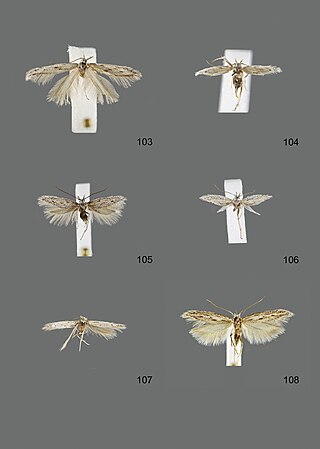
Megacraspedus is a genus of moths in the family Gelechiidae, found primarily in the Palearctic.

Megacraspedus multispinella is a moth of the family Gelechiidae. It is found in Russia. The habitat consists of rocky steppe slopes with lush low vegetation.
Megacraspedus euxena is a moth of the family Gelechiidae. It was described by Edward Meyrick in 1904. It is found in Australia, where it has been recorded from Western Australia.
Megacraspedus hoplitis is a moth of the family Gelechiidae. It was described by Edward Meyrick in 1904. It is found in Australia, where it has been recorded from Western Australia.
Megacraspedus ischnota is a moth of the family Gelechiidae. It was described by Edward Meyrick in 1904. It is found in Australia, where it has been recorded from Western Australia.
Megacraspedus isotis is a moth of the family Gelechiidae. It was described by Edward Meyrick in 1904. It is found in Australia, where it has been recorded from Western Australia.
Megacraspedus platyleuca is a moth of the family Gelechiidae. It was described by Edward Meyrick in 1904. It is found in Australia, where it has been recorded from New South Wales, Victoria, Tasmania and Western Australia.
Megacraspedus popularis is a moth of the family Gelechiidae. It was described by Edward Meyrick in 1904. It is found in Australia, where it has been recorded from New South Wales and Tasmania.
Megacraspedus sclerotricha is a moth of the family Gelechiidae. It was described by Edward Meyrick in 1904. It is found in Australia, where it has been recorded from New South Wales.
Megacraspedus serica is a moth of the family Gelechiidae. It was described by Edward Meyrick in 1909. It is found in South Africa.
Megacraspedus pusillus is a moth of the family Gelechiidae. It was described by Walsingham in 1903. It is found in Spain.
Megacraspedus tristictus is a moth of the family Gelechiidae. It was described by Walsingham in 1910. It is found in southern France and Italy.
Megacraspedus tutti is a moth of the family Gelechiidae. It was described by Walsingham in 1887. It is found in France.
Megacraspedus aenictodes is a moth of the family Gelechiidae. It was described by Turner in 1919. It is found in Australia, where it has been recorded from Queensland.
Megacraspedus cerussatellus is a moth of the family Gelechiidae. It was described by Rebel in 1930. It is found in the border area between Bulgaria and Greece.
Megacraspedus consortiella is a moth of the family Gelechiidae. It was described by Aristide Caradja in 1920. It is found in Russia's Alai Mountains.
Megacraspedus monolorellus is a moth of the family Gelechiidae. It was described by Rebel in 1905. It is found in Asia Minor.
Megacraspedus niphodes is a moth of the family Gelechiidae. It was described by Oswald Bertram Lower in 1897. It is found in Australia, where it has been recorded from Victoria and Tasmania.
Megacraspedus sagittifera is a moth of the family Gelechiidae. It was described by Oswald Bertram Lower in 1900. It is found in Australia, where it has been recorded from New South Wales.
Megacraspedus stratimera is a moth of the family Gelechiidae. It was described by Oswald Bertram Lower in 1897. It is found in Australia, where it has been recorded from South Australia.

